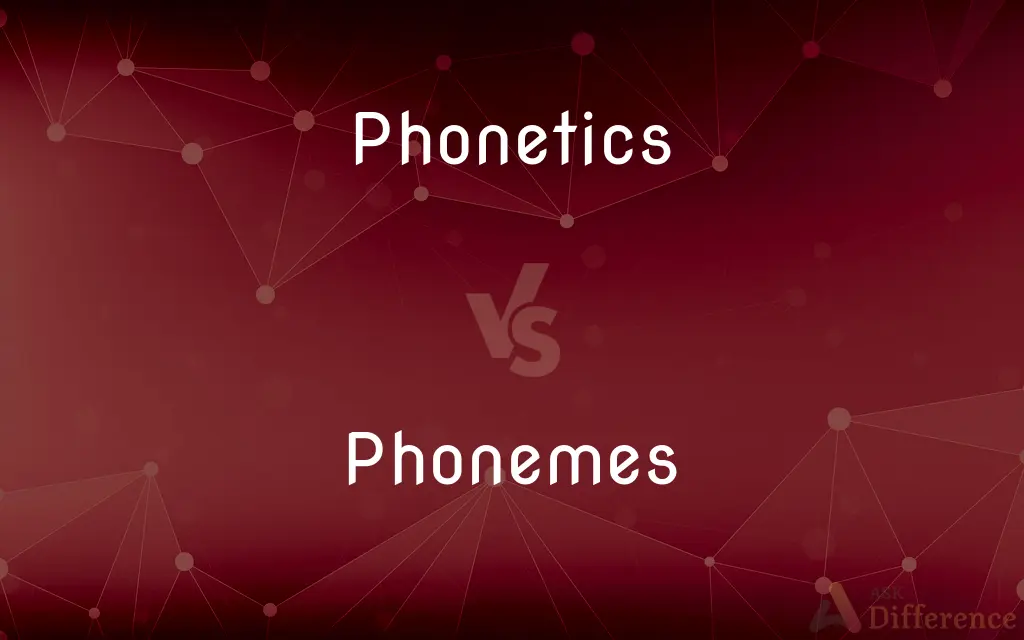Phonetics vs. Phonemes — What's the Difference?
By Tayyaba Rehman & Fiza Rafique — Published on February 10, 2024
Phonetics is the study of sounds in human speech. Phonemes are the distinct units of sound in a language that distinguish one word from another.

Difference Between Phonetics and Phonemes
Table of Contents
ADVERTISEMENT
Key Differences
Phonetics involves the analysis and classification of sounds within and across languages, focusing on their physical properties. It examines how sounds are produced (articulatory phonetics), transmitted (acoustic phonetics), and perceived (auditory phonetics). Phonetics is concerned with the physical aspects of sounds, without assigning any meaning to them.
Phonemes, on the other hand, represent the smallest units of sound that can convey a distinction in meaning between words. For example, the phonemes /p/ and /b/ in "pat" and "bat" change the meaning of these words. Phonemes are abstract and are not tied to any specific sound; rather, they encompass a set of sounds that are perceived as the same by speakers of a language.
While phonetics provides tools and methods to describe and analyze the sounds of speech in a detailed and systematic way, phonemes are more about the functional aspect of sounds in encoding and differentiating meaning within a particular language. Phonetics is the broader field that includes the study of all sounds in human speech, while phonology, which includes the study of phonemes, focuses on how sounds function within a specific language system.
The relationship between phonetics and phonemes is intrinsic, as phonetics offers the foundational understanding of sounds that phonemes depend on. Phonemes are identified and defined within the framework provided by phonetics, illustrating how the physical aspects of sounds relate to linguistic meaning.
In summary, phonetics is the comprehensive study of speech sounds, encompassing their production, transmission, and reception, without regard to their meaning. Phonemes are conceptual units within the phonology of a language that distinguish meaning, relying on the nuances in sound identified through phonetic analysis.
ADVERTISEMENT
Comparison Chart
Definition
Study of physical aspects of speech sounds
Smallest sound units that distinguish meaning
Focus
Production, transmission, and perception of sounds
Function of sounds in language to differentiate words
Nature
Physical and concrete
Abstract and functional
Scope
All human speech sounds
Sounds specific to a language's phonology
Application
Describes how sounds are made and heard
Identifies sounds critical for language structure
Compare with Definitions
Phonetics
Study of the physical properties of speech sounds.
Acoustic phonetics analyzes sound waves to understand speech.
Phonemes
Two words that differ by only one phoneme.
'Fit' and 'sit' are a minimal pair differing in the initial phoneme.
Phonetics
The science of speech sounds and their production.
In phonetics, we learn how to articulate sounds clearly.
Phonemes
Variations of a phoneme that do not change word meanings.
The different 't' sounds in 'top' and 'stop' are allophones of the same phoneme.
Phonetics
Branch of phonetics dealing with how speech sounds are produced.
Articulatory phonetics examines the role of the tongue and lips in sound formation.
Phonemes
The smallest unit of sound that distinguishes meaning in a language.
Changing the phoneme /p/ to /b/ in 'pat' makes 'bat.'
Phonetics
The visual representation of speech sounds.
Phonetic transcription uses symbols to show how words are pronounced.
Phonemes
The ability to hear, identify, and manipulate phonemes.
Phonemic awareness is crucial for learning to read.
Phonetics
Focuses on how the ear, auditory nerve, and brain perceive sounds.
Auditory phonetics explores how we distinguish different sounds.
Phonemes
The set of phonemes used in a particular language.
The phonemic inventory of English includes around 44 phonemes.
Phonetics
The branch of linguistics that deals with the sounds of speech and their production, combination, description, and representation by written symbols.
Phonemes
The smallest phonetic unit in a language that is capable of conveying a distinction in meaning, as the m of mat and the b of bat in English.
Phonetics
The system of sounds of a particular language.
Phonemes
Plural of phoneme
Phonetics
(linguistics) The study of the physical sounds of human speech, concerned with the physical properties of speech sounds (phones), and the processes of their physiological production, auditory reception, and neurophysiological perception, and their representation by written symbols.
Phonetics
The doctrine or science of sounds; especially those of the human voice; phonology.
Phonetics
The art of representing vocal sounds by signs and written characters.
Phonetics
The branch of acoustics concerned with speech processes including its production and perception and acoustic analysis
Common Curiosities
How are phonetics and phonemes related?
Phonetics provides the foundation for understanding the physical properties of sounds, which helps in identifying and classifying phonemes within languages.
What is phonetics?
Phonetics is the scientific study of human speech sounds.
What are phonemes?
Phonemes are the smallest units of sound in a language that can distinguish one word from another.
Can a sound have more than one phoneme?
No, a sound is a single acoustic event, but one phoneme may be represented by different sounds (allophones) in various contexts.
Is phonemic awareness the same as phonological awareness?
Phonemic awareness is a subset of phonological awareness, focusing specifically on the recognition and manipulation of phonemes.
Why is phonetic transcription important?
Phonetic transcription provides a precise way to communicate how words are pronounced, transcending the ambiguities of spelling.
What's an example of a minimal pair?
"Cat" and "bat" are a minimal pair, differing only in the initial phoneme.
What role do phonemes play in language learning?
Understanding phonemes is crucial for language learning, especially for accurate pronunciation and distinguishing word meanings.
How many phonemes are in English?
English has about 44 phonemes, though the number can vary slightly depending on the dialect.
What is the difference between a phoneme and a letter?
A phoneme is a sound unit in speech, while a letter is a written symbol in an alphabet. Letters can represent different phonemes in different contexts.
Can phonetic principles apply to all languages?
Yes, phonetic principles are universal and can describe the sounds of any language.
How is a phoneme different from an allophone?
A phoneme is a theoretical sound unit that distinguishes meaning, while an allophone is a variation of a phoneme that doesn't change word meaning.
What is a phonetic alphabet?
A phonetic alphabet is a set of symbols that represent the distinct sounds of a language, like the International Phonetic Alphabet (IPA).
Why is acoustic phonetics important?
Acoustic phonetics helps us understand the physical properties of speech sounds, which is essential for fields like speech therapy and linguistics.
Do all languages have the same phonemes?
No, each language has a unique set of phonemes that its speakers use to distinguish meanings.
Share Your Discovery

Previous Comparison
Bar vs. Barg
Next Comparison
Yogurt vs. Sour CreamAuthor Spotlight
Written by
Tayyaba RehmanTayyaba Rehman is a distinguished writer, currently serving as a primary contributor to askdifference.com. As a researcher in semantics and etymology, Tayyaba's passion for the complexity of languages and their distinctions has found a perfect home on the platform. Tayyaba delves into the intricacies of language, distinguishing between commonly confused words and phrases, thereby providing clarity for readers worldwide.
Co-written by
Fiza RafiqueFiza Rafique is a skilled content writer at AskDifference.com, where she meticulously refines and enhances written pieces. Drawing from her vast editorial expertise, Fiza ensures clarity, accuracy, and precision in every article. Passionate about language, she continually seeks to elevate the quality of content for readers worldwide.















































